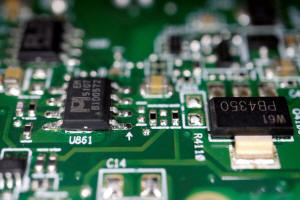Dutch to restrict semiconductor tech exports to China, joining US effort
 Send a link to a friend
Send a link to a friend
 [March 09, 2023] By
Toby Sterling, Karen Freifeld and Alexandra Alper [March 09, 2023] By
Toby Sterling, Karen Freifeld and Alexandra Alper
AMSTERDAM/WASHINGTON (Reuters) -The Netherlands' government on Wednesday
said it plans new restrictions on exports of semiconductor technology to
protect national security, joining the U.S. effort to curb chip exports
to China.
The announcement marked the first concrete move by the Dutch, who
oversee essential chipmaking technology, toward adopting rules urged by
Washington to hobble China's chipmaking industry and slow its military
advances.
The U.S. in October imposed sweeping export restrictions on shipments of
American chipmaking tools to China, but for the restrictions to be
effective it needs other key suppliers in the Netherlands and Japan, who
produce key chipmaking technology, to agree. The allied countries have
been in talks on the matter for months.
Dutch Trade Minister Liesje Schreinemacher announced the decision in a
letter to parliament, saying the restrictions will be introduced before
the summer.

Her letter did not name China, a key Dutch trading partner, nor did it
name ASML Holding NV, Europe's largest tech firm and a major supplier to
semiconductor manufacturers, but both will be affected. It specified one
technology that will be impacted is "DUV" lithography systems, the
second-most advanced machines that ASML sells to computer chip
manufacturers.
"Because the Netherlands considers it necessary on national security
grounds to get this technology into oversight with the greatest of
speed, the Cabinet will introduce a national control list," the letter
said.
A White House representative did not immediately respond to a request
for comment.
Chinese foreign ministry spokesperson Mao Ning said on Thursday that
China resolutely opposed the Netherlands' decision and said Beijing had
lodged representations with the Dutch side.
"We hope the Dutch side will adhere to an objective and fair position
... act to safeguard its own interests, and not follow the abuse of
export control measures by certain countries," Mao said, without naming
countries.
China has frequently called the United States a "tech hegemony" in
response to export controls imposed by Washington.
ASML said in a response it expects to have to apply for licenses to
export the most advanced segment among its DUV machines, but that would
not impact its 2023 financial outlook.
[to top of second column] |

Semiconductor chips are seen on a
printed circuit board in this illustration picture taken February
17, 2023. REUTERS/Florence Lo/Illustration/File Photo

ASML dominates the market for lithography systems, multimillion
dollar machines that use powerful lasers to create the minute
circuitry of computer chips.
The company expects sales in China to remain about flat at 2.2
billion euros in 2023 - implying relative shrinkage as the company
expects overall sales to grow by 25%. Major ASML customers such as
Taiwan Semiconductor Manufacturing Co and Intel Corp are engaged in
capacity expansions.
ASML has never sold its most advanced "EUV" machines to customers in
China, and the bulk of its "DUV" sales in China go to relatively
less advanced chipmakers. Its biggest South Korean customers,
Samsung and SK Hynix both have significant manufacturing capacity in
China.
The Dutch announcement leaves major questions unanswered, including
whether ASML will be able to service the more than 8 billion euros
($8.44 billion) worth of DUV machines it has sold to customers in
China since 2014.
Schreinemacher said the Dutch government had decided on measures "as
carefully and precisely as possible ... to avoid unnecessary
disruption of value chains."
"It is for companies of importance to know what they are facing and
to have time to adjust to new rules," she wrote.
Japan is expected to issue an update on its chip equipment export
policies as soon as this week, sources said.
"For national security reasons we constantly review export rules,
but it doesn't mean we have decided anything at this point," Japan's
Minister for Economy, Trade and Industry (METI) Yasutoshi Nishimura
said in parliament when asked about possible restrictions.

A METI official involved in export controls told Reuters there was
no plan to announce any changes on Thursday or Friday. The official,
who spoke on condition of anonymity, was not authorised to talk to
media.
($1 = 0.9480 euros)
(Reporting by Toby Sterling; Additional reporting by Tim Kelly,
Hitoshi Ishida and Eduardo Baptista; Editing by Anna Driver, Mark
Porter, Jamie Freed and Shounak Dasgupta)
[© 2023 Thomson Reuters. All rights
reserved.]
This material may not be published,
broadcast, rewritten or redistributed.
Thompson Reuters is solely responsible for this content. |